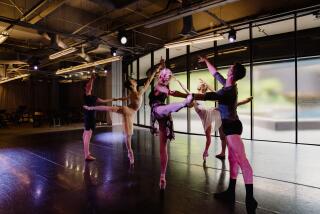Theater of the Mind : Performance Art: UCSD professor and conceptual artist Eleanor Antin sends her black ballerina alter ego on another adventure, this time with a tongue-in-cheek silent film.
- Share via
SAN DIEGO — Glasnost is having a profound effect on art in the Soviet Union. As reported in Wednesday’s Times, expatriate artists such as Mstislav Rostropovich and Rudolf Nureyev are returning for emotion-filled performances in their homeland.
A lesser-known story is that of artists who fell into disfavor shortly after the revolution and who are now having their work unearthed and brought to new prominence.
One such artist is film maker Yevgeny Antinov, director of “The Last Night of Rasputin,” a silent film from 1924.
One description says Antinov was “despised by the modernists for his love of narrative, hated by the traditionalists for his modernist techniques, disapproved of by the government for his self-indulgence and individualism, and ignored by their lackey scholars.”
But little else is known about the avant-gardist. In fact, the only information about Antinov and his work has been uncovered by Eleanor Antin, a conceptual artist and a professor in the visual arts department at UC San Diego.
“If I wasn’t an artist, I’d be a historian,” Antin says.
Actually, she’d make a better con artist.
Antinov, you see, is a figment of Antin’s imagination. He is the latest creation in Antin’s continuing series of fictional characters she brings to life on stage and on film.
The best known of Antin’s creations is the black ballerina Eleanora Antinova, who, according to Antin lore, left her native United States for Paris, met the famed choreographer Diaghilev, and ended up being a prima ballerina with the Ballet Russe.
In Antinova’s new adventure, we learn she was married to the film maker Antinov and is trying to restore his place in history by reintroducing his films--in which she conveniently stars.
“I’m always creating these worlds for Antinova,” Antin said. “I like to transform the past--the past is always being reinterpreted in light of the present.”
San Diego audiences will have their first chance to see Antin’s latest work Friday when she performs “The Last Night of Rasputin” at the Sixth Avenue Playhouse, sponsored by Sushi Performance Gallery.
The first half of the show is Antin in her ballerina persona, reminiscing about her life with the late film director. The second half is the screening of the melodramatic, tongue-in-cheek, 38-minute film, which Antin wrote, produced and directed. The piece premiered last May at the Whitney Museum’s 1989 Biennial Exhibition.
It is a clever twist on the Antinova saga, providing Antin with another avenue to address her “artistic, political and psychological” concerns, which have to do with disenfranchised people. Last year she told the New York Times that her ballerina character was “ideal, because as an artist she’s an outsider, like women and blacks in our society. And a black ballerina is a condition contrary to fact, even today.”
The ballerina persona is also a personal fantasy for Antin, who is the daughter of Polish and Jewish immigrants. Her mother, who once worked in the Yiddish stage, frowned on Antin’s conceptual visual art, but warmed to her daughter’s stage personas. (“My daughter, the ballerina,” says Antin,jokingly imitating her mother.)
Antin’s early acting career was fairly mainstream. She was a member of Actor’s Equity and was in a touring production of “Bus Stop.” But she returned to college and pursued an alternative artistic route.
The impish, 50-ish Antin presents her serious concerns in a light-hearted manner. She is incorrigibly funny, a latter-day Fanny Brice capable of transformations a la Tracey Ullman. Those show biz comparisons may be an odd description for a performance artist as respected and renowned as Antin, working in a genre that often takes itself verrrry seriously, but she makes no apologies for her approach.
“I was always funny,” she says. “It’s my nature.
“I consider myself a feminist, and my work started at about the same time as the women’s movement. There was a lot of material being created that was serious. I was serious, too, but I was always funny. My comedy is ironical.”
There’s more irony in store. Later this year, most likely in the fall, Antin will take her act to the Soviet Union. How fortunate. They could use the laughs.
More to Read
The biggest entertainment stories
Get our big stories about Hollywood, film, television, music, arts, culture and more right in your inbox as soon as they publish.
You may occasionally receive promotional content from the Los Angeles Times.










